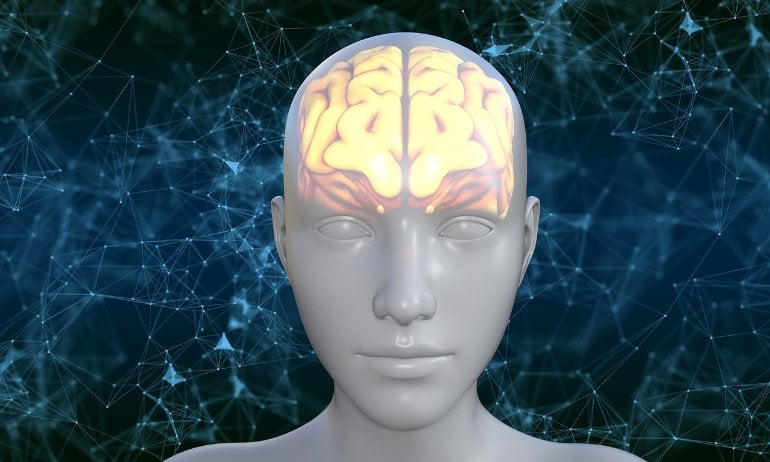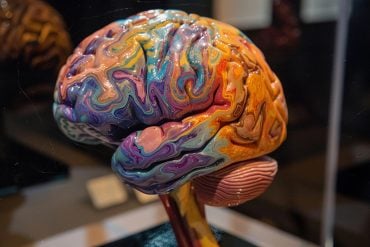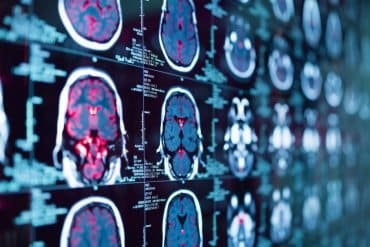Summary: In mouse models of neurodevelopmental disorders, researchers found social deficits were mediated by microbes in the gut. By contrast, hyperactivity is controlled by genetics. Treatment with a specific microbe helped improve social behavior.
Source: Baylor College of Medicine
When we think about the causes of neurological disorders and how to treat them, we think about targeting the brain. But is this the best or only way? Maybe not.
New research by scientists at Baylor College of Medicine suggests that microbes in the gut may contribute to certain symptoms associated with complex neurological disorders.
The findings, published in the journal Cell, also suggest that microbe-inspired therapies may one day help to treat them.
Dr. Mauro Costa-Mattioli, professor and Cullen Foundation Endowed Chair in neuroscience and director of the Memory and Brain Research Center at Baylor, discovered with his team that different abnormal behaviors are interdependently regulated by the host’s genes and microbiome. Specifically, the team found that in mouse models for neurodevelopmental disorders, hyperactivity is controlled by the host’s genetics, whereas social behavior deficits are mediated by the gut microbiome.
More importantly from a therapeutic perspective, they found that treatment with a specific microbe that promotes the production of compounds in the biopterin family in the gut or treatment with a metabolically active biopterin molecule improved the social behavior but not motor activity.
“We are the bearers of both host and microbial genes. While most of the focus has traditionally been in host genes, the gut microbiome, the community of microorganisms that live within us, is another important source of genetic information,” Costa-Mattioli said.
The work by Costa-Mattioli’s group offers a different way of thinking about neurological disorders in which both human and microbial genes interact with each other and contribute to the condition. Their findings also suggest that effective treatments would likely need to be directed at both the brain and the gut to fully address all symptoms. Additionally, they open the possibility that other complex conditions, such as cancer, diabetes, viral infection or other neurological disorders may have a microbiome component.
Brain-gut-microbiome crosstalk
“It’s very difficult to study these complex interactions in humans, so in this study, we worked with a mouse model for neurodevelopmental disorders in which the animals lacked both copies of the Cntnap2 gene (Cntnap2-/- mice),” said co-first author Sean Dooling, a Ph.D. candidate in molecular and human genetics in the Costa-Mattioli lab.
“These mice presented with social deficits and hyperactivity, similar to those observed in autism spectrum disorders (ASD). In addition, these mice, like many people with ASD, also had changes in the bacteria that make up their microbiome compared to the mice without the genetic change.”
Further experiments showed that modulating the gut microbiome improved the social behavior in the mutant mice, but did not alter their hyperactivity, indicating that the changes in the microbiome selectively contribute to the animals’ social behavior.
“We were able to separate the contribution of the microbiome and that of the animal’s genetic mutation on the behavioral changes,” Dooling said. “This shows that the gut microbiome shouldn’t be ignored as an important variable in studying health and disease.”
Equipped with this knowledge, the researchers dug deeper into the mechanism underlying the microbiome’s effect on the animal’s social deficits. Based on their previous work, the investigators treated the mice with the probiotic microbe, L. reuteri.
“We found that L. reuteri also can restore normal social behavior but cannot correct the hyperactivity in Cntnap2-/- mice,” said co-first author Dr. Shelly Buffington, a former postdoctoral fellow in the Costa-Mattioli lab and now an assistant professor at the University of Texas Medical Branch in Galveston.

However, the bigger surprise came when the investigators administered to the asocial mice a metabolite or compound they found was increased in the host’s gut by L. reuteri. They discovered that the animals’ social deficits also were improved after treating them with the metabolite instead of the bacteria.
“This provides us with at least two possible ways to modulate the brain from the gut, with the bacteria or the bacteria-induced metabolite,” said Buffington.
Bacteria to heal your brain & beyond
Could this work inspire new breakthroughs in treating neurological disorders? While it is still too early to say for sure, the investigators are particularly excited about the translational implications of their findings. “Our work strengthens an emerging concept of a new frontier for the development of safe and effective therapeutics that target the gut microbiome with selective probiotic strains of bacteria or bacteria-inspired pharmaceuticals,” Buffington said.
“As we learn more about how these bacteria work, we will be able to more precisely and effectively leverage their power to help treat the brain and perhaps more,” Dooling added.
This research represents important step forward in the field as many disorders, especially those affecting the brain, remain very difficult to treat.
“Despite all the scientific advances and the promise of gene manipulation, it is still difficult to modulate human genes to treat diseases, but modulating our microbiome may be an interesting, noninvasive alternative,” said Costa-Mattioli. Indeed, L. reuteri currently is being tested in a clinical trial in Italy in children with autism, and Costa-Mattioli aims to start his own trial soon.
“In my wildest dreams, I could have never imagined that microbes in the gut could modulate behavior and brain function. To think now that microbial-based strategies may be a viable way to treat neurological dysfunction, is still wild, but very exciting.”
Other contributors to this work include Martina Sgritta, Cecilia Noecker, Oscar D. Murillo, Daniela F. Felice and Peter J. Turnbaugh. The authors are affiliated with one or more of the following institutions: Baylor College of Medicine, University of California, San Francisco and Chan Zuckerberg Biohub.
Funding: This work was supported by funding from NIH (R01 MH112356, R01 HL122593, R01 DK114034, 2T32AI060537-16), Sammons Enterprise, Nadia’s Gift Foundation Innovator and Damon Runyon Cancer Research Foundation (DRR-42-16).
About this neurology research news
Source: Baylor College of Medicine
Contact: Graciela Gutierrez – Baylor College of Medicine
Image: The image is in the public domain
Original Research: Closed access.
“Dissecting the contribution of host genetics and the microbiome in complex behaviors” by Mauro Costa-Mattioli et al. Cell
Abstract
Dissecting the contribution of host genetics and the microbiome in complex behaviors
Highlights
- •Host genetics and microbiota differentially regulate behaviors in an ASD mouse model
- •Microbe therapy ( L. reuteri) rescues Cntnap2 −/− social deficits but not hyperactivity
- •Microbe-induced metabolite (BH4) selectively rescues Cntnap2 −/− social deficits
- •L. reuteri and BH4 improves Cntnap2 −/− social-reward-mediated synaptic transmission
Summary
The core symptoms of many neurological disorders have traditionally been thought to be caused by genetic variants affecting brain development and function.
However, the gut microbiome, another important source of variation, can also influence specific behaviors. Thus, it is critical to unravel the contributions of host genetic variation, the microbiome, and their interactions to complex behaviors. Unexpectedly, we discovered that different maladaptive behaviors are interdependently regulated by the microbiome and host genes in the Cntnap2−/− model for neurodevelopmental disorders.
The hyperactivity phenotype of Cntnap2−/− mice is caused by host genetics, whereas the social-behavior phenotype is mediated by the gut microbiome. Interestingly, specific microbial intervention selectively rescued the social deficits in Cntnap2−/− mice through upregulation of metabolites in the tetrahydrobiopterin synthesis pathway.
Our findings that behavioral abnormalities could have distinct origins (host genetic versus microbial) may change the way we think about neurological disorders and how to treat them.







